| item(s), Total: $0.00 View Cart |
| Shopping cart is empty. |
Thanks to those of you who follow us on Facebook and who gave us suggestions on things you'd like to see covered in future newsletters. I've taken some of your ideas on board and you can expect to see more down the track, too. We really do appreciate your feedback and ideas. I always find gardeners are a great bunch of people - willing to share ideas, experiences, cuttings seeds & even produce! Maybe if the world was made up of gardeners there'd be a lot less misery in the world. But I digress... THANK YOU to our on-line customers who completed the recent survey regarding your experience & satisfaction with our on-line shop; your time is appreciated and it will help us bring you more of what YOU want. The winner of a $50 voucher to spend with us (as a thanks for completing the survey) is Joanna A. Well done!! We are VERY, very close to launching our new on-line VIP membership. By creating a log on and signing in, you will be able to access a special "Members Only" section of our website which will have special offers (updated throughout the year), competitions, advice and more!!! Plus your details will be remembered and autofill when you proceed to checkout, saving time for our regular customers. Watch out for an email announcing the launch very soon!!! I hope you enjoy this newsletter & look forward to seeing you in the Spring!
Linda & the Team. In this newsletter:What to plant now WHAT TO PLANT NOW
At this time of year, some winter crops (like snow peas, and brassicas like cabbage, kale, broccoli) can still be grown - BUT be prepared for increased pest attack. If you can use insect netting (an old net curtain or similar will do nicely) you can still get good crops before the heat really arrives. Other crops will do fine for a while longer - things like carrots, celery, onions, spring onions, beetroot, silverbeet, spinach, turnips, potatoes, lettuce. See our See our 'When to Sow & How to Sow' chart for more information.
If you're not sure about growing from seed, then seedlings may be a safer bet. Remember many 'box stores' sell things grown in climatically controlled situations out of season. This means when you plant them out into the 'real world' (ie. your garden) they are most likely going to die. Our Certified Organic seedlings are NOT grown in hothouse conditions and are only available in-season, which means they are only available at the RIGHT time for the season; and you are more likely to have them thrive and produce. For more information on growing from seed, click here. Jobs for the Garden in Late Winter/Early Spring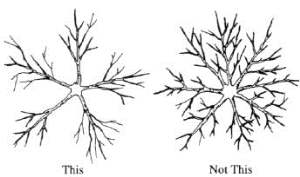 Pruning. August is the perfect time to prune deciduous trees and shrubs - including fruit trees and roses. Don't be afraid to give it a go. Yes - there are some brilliant workshops and books you might like to check out if you want to master the art; but the main point of pruning is to keep things managable and healthy. Pruning. August is the perfect time to prune deciduous trees and shrubs - including fruit trees and roses. Don't be afraid to give it a go. Yes - there are some brilliant workshops and books you might like to check out if you want to master the art; but the main point of pruning is to keep things managable and healthy. Basic principles are: removing growth that doesn't conform to the ideal shape of the tree; especially vigorous up-right shoots, and those inwardly directed. If it's dead, diseased or damaged, old or spindly - pruning back cleanly will bring a new lease of life in the spring. Thin out crowded growth so that shoots are well spaced. Keeping things open provides better sunlight and airflow and promotes healthier growth. As a general rule, shorten back last season's growth by about two thirds to encourage new fruiting spurs to form closer to the main branch. The diagram above (an overhead view) shows what you are trying to achieve. See Peter Coppin's great article below on Winter care of deciduous fruit trees for more information. NOW is a great time to fertilise your fruit trees with organic fertilisers (our concentrate mixes, compost, manure, blood & bone, rock dust - etc.) Organic fertilisers are naturally slow released (but also longer lasting) - so getting them on now allows the plants to make full use of them the minute the are beginning to put on new growth. Click here to see our range of fertilisers available. Last chance to plant new bare-rooted trees. Prepare the ground and get new trees in before they emerge from dormancy in spring. They will get off to a flying start. Click here for a fact sheet.
Prepare garden beds for spring planting. To improve sandy soils and replenish existing beds, dig in manure and compost and leave to sit. You can also add rock minerals to provide trace elements. Ensure the soil has a reasonable moisture content and add clay (have you tried our Sand Remedy?) if necessary to help with water holding. By the time you are ready to plant out seedlings in few weeks, this will be nicely aged and things will get off to a flying start. Control weeds. Slash, pull, steam or flame them - whatever takes your fancy! But do it before they set seed. Add them to a compost pile (especially if they have no seed heads on them) and recycle the nutrients they have stolen from your soil. Watch for pests like slugs, snail, scale (and the sooty mould that often grows where they are). See our article below on ideas to treat these common garden pests. SLUGS, SNAILS, SLATERS AND CATERPILLARS - Winning the War Naturally!
In the day time, check out places snails like to hide - under ledges, edges of paving, empty pots, amongst bricks or timber lying around. Beer traps are a great idea. Use empty plastic containers (eg. margerine/butter containers), buried into the soil, with a bit of any beer in the bottom (a couple of centimetres is all that's needed). Snails will be attracted to the beer and drown. Traps can be emptied and re-used over again. Snail pellets are an effective way to eliminate snails & slugs - but be aware most on the market contain heavy pesticides which you may not want in your garden, or around your kids or pets. Multiguard pellets are an iron based compound and are the safest to use; not being an actual poison. They USED to be Certified Organic, but they contain a compound called ETDA that is no longer allowed, due to carcinogenic links. Before you freak out too much, you might want to check product labels in your home on things like soaps, shampoos, washing detergents, cosmetics and even some food and drink products - you will probably find it in most of these (Certified Organic products excepted). Copper is an effective barrier against slugs and snails. Copper tape or thick wire bent into circles and placed around seedlings will protect them - they don't like crossing it. Other dry, scratchy materials like rough sawdust & crushed eggshells also make a barrier they don't like to cross - however the effectiveness of this is lost if the material is wet. Coffee grounds are also useful in deterring slugs & snails; but you do need a decent layer of them to do the trick. Slaters
Try a rolled up newspaper (open edges outerwards) secured with a lacky band each end. Soak the paper and leave it in the garden. Slaters will crawl in between the damp pages and the whole paper can be collected for disposal.
Another great idea for slater control is a home made trap with some milk, cream or yoghurt in it - when it sours it seems to be even more attractive to slaters, who will fall in and drown. While a bit smelly, this is a cheap and effective method of control. Using cut down plastic containers to form a physical barrier or "collar" around young seedlings is also helpful. Once plants are larger, they are less vunerable to attack; so collars can be removed. Slaters (in small numbers) in the garden can be useful - they help in the breakdown of organic matter; which is why you find them in your mulch. To stop seedlings being damaged, it is a good idea to remove mulch from garden beds where you are raising young seedlings. Caterpillars
Garlic and chilli sprays are good deterrants for many chewing and sap sucking insects. Remember that no organic spray is systemic (which means it is NOT absorbed into the cellular structure of the plant) - it acts on the plant surface only. Any overhead watering or rain will wash off your spray and you will need to re-apply.
Cabbage butterflies are said to be territorial - so by tricking them that other butterflies are already around, laying their eggs, hopefully they will leave your garden and try elsewhere. Use light string or fishing line to suspend small white 'butterflies' that move in the wind. I have seen them made by cutting out shapes from an empty plastic 2L milk bottle, and made from white bread tags. Empty eggshells upturned on garden stakes supposedly do the same thing. These solutions may not work 100% but are certainly easy DIY options to try. The BEST way to ensure your crops are not damaged is to use exclusion netting. You can buy insect mesh by the metre and fashion a cover for your entire vegie beds, or use old net curtains, or also those little pop-up food covers that look like umbrellas work well popped over individual plants.
WINTER/EARLY SPRING CARE OF FRUIT TREESWhen I requested ideas fors this newsletter, one topic that came up more than once was that of pruning and caring for fruit trees. Now while we have a number of fruit trees, I certainly am no expert on pruning (hacking, possibly) - so I felt I should present to you quality information from a reliable source! Peter Coppin would be Perth's most well known and respected expert on fruit tree management, following a career with the Ag Department, he now runs workshops and consults. His website is www.petercoppin.com and I would suggest (if you haven't already) sign up for his newsletter and contact him if you need expert help with your fruit trees. Peter runs workshops regularly in Perth and beyond on fruit tree pruning and care, and propagation and grafting that we would highly recommend if you wish to learn 'hands on' from an expert. Peter has very kindly given permission for GLSC to use his Fact Sheet, reproduced here. Deciduous Fruit Trees Need Winter Care - © Peter Coppin 1998, revised 2006, 2012 & 2014While fruit trees are either dormant or not actively growing during winter, there are a number of jobs that need to be done to ensure healthy flowering and growth next season. Pruning Deciduous Trees & Vines:
Winter Chill – what it means:
Copper Sprays:Copper is the best fungicide we know, closely followed by zinc and manganese. They are also organically based, so it makes sense to use them. Using them as fungicides has the added benefit of being nutritional, as they are the three most important trace elements for fruit trees and are deficient in most of our soils. Oil Sprays:
Fertiliser and Water:Healthy, strong trees suffer less from pests and diseases, and keeping trees well mulched, fed and watered helps achieve this. Organic growers also say that Potassium is important for disease resistance, but be careful not to apply too much as it is easy to cause toxicity. Keep a Diary:One of the handiest ‘tools in the shed’ is a diary. Record all the information you can, such as the dates of bud-swell, bud-burst, first flower, full blossom, etc, for the different varieties as well as the different fruits. This is so helpful in knowing when to do these critically important jobs.
NEW PRODUCTS @ THE GREEN LIFE SOIL CO - and what they can do for YOUR garden!
Biochar is back in stock!This time it's locally produced; made by a new business out GinGin way that are looking at turning waste product into something useful for agriculture. Biochar provides carbon in a very stable form. (61% pure carbon.) It lasts for hundreds if not thousands of years, and being highly porous, is the perfect habitat for soil microbes who colonise it, as well as helping to retain water and nutrients. Biochar is ideal to add to sandy soil and containers. Pre-soak biochar in your favourite liquid fertiliser before using in the garden to supercharge it with nutrients. For more info on Biochar - click here. Blood & Bone
Plus we add ROCK DUST - so you are getting a range of trace elements too! The Rock Dust also contains beneficial microbes to help your plants access the nutrients in the mix. So make sure you give our Blood & Bone a try; it is fantastic value for a top quality product. Waste Not Wood Not Briquettes
Pick up a box in store or online.
SPECIAL OFFER FOR OUR NEWSLETTER VIP CUSTOMERS
Sand Remedy is a quality product suitable for all plants. It is Certified Organic so it's safe for you and your pets, too! We know if you try it you'll like it. So with any order (online or bulk delivery booked by 31st August 2014) you'll receive a FREE 5kg tub (valued at $32). For online orders - add a 5kg Sand Remedy to your cart, then at checkout use the discount code SANDREM to apply the full refund for the product. For bulk deliveries placed over the phone - please request the Sand Remedy VIP deal when placing your order. Valid one per household until 5.00pm 31.8.14 Remember - watch out for our email launching our Online VIP club very soon, for even more special offers!Until next time - have fun in the garden!
|



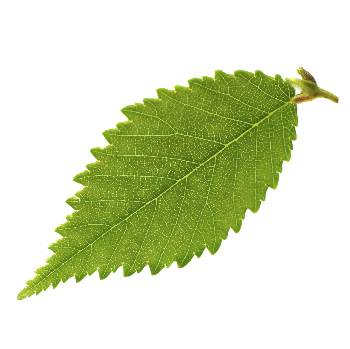 Hi There and welcome to our Winter newsletter. We've had some great rain which is fantastic long term for the soil, but it does bring it's frustrations when wet weekends come around and you can't get outside to get those jobs done! But then come some lovely sunny days, and aren't they glorious in Winter?
Hi There and welcome to our Winter newsletter. We've had some great rain which is fantastic long term for the soil, but it does bring it's frustrations when wet weekends come around and you can't get outside to get those jobs done! But then come some lovely sunny days, and aren't they glorious in Winter? Until then - Happy Gardening!
Until then - Happy Gardening! Spring is right around the corner - so once the weather warms up it will be time to sow things like: Tomato, capsicum, chilli, corn, watermelon, rockmelon, zucchini, cucumbers, beans, eggplant - etc! It can be difficult ascertaining WHEN to start sowing seed; as weather conditions can still be variable. Every gardener wants to get off to an early start, but it can be a gamble. I guess that's what can make gardening so rewarding! :-D
Spring is right around the corner - so once the weather warms up it will be time to sow things like: Tomato, capsicum, chilli, corn, watermelon, rockmelon, zucchini, cucumbers, beans, eggplant - etc! It can be difficult ascertaining WHEN to start sowing seed; as weather conditions can still be variable. Every gardener wants to get off to an early start, but it can be a gamble. I guess that's what can make gardening so rewarding! :-D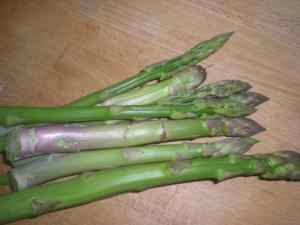 Plant Asparagus and Rhubarb crowns (now in stock). These perennials are both worthwhile additions to your food garden; producing well for many years under the right conditions. We have Fact Sheets on growing
Plant Asparagus and Rhubarb crowns (now in stock). These perennials are both worthwhile additions to your food garden; producing well for many years under the right conditions. We have Fact Sheets on growing  Slugs & snails are prevalent in the cool and wet months of the year, and can decimate seedlings overnight. The best way to control their numbers QUICKLY is to go outside at night, with a torch when they're on the move and hand pick them off your plants. Personally, I can't stand slug slime; so gloves are essential for me. A quick stomp with a gum boot will despatch them; however if you're squeamish, droppping them into a bucket of warm, salty water is the best way to despatch them. Don't be tempted to throw them over the fence - there a good chance they'll just come home. And putting them in your wheelie bin is a sure fire way to give yourself (or your loved ones) an interesting experience next time they take out the rubbish. Doing a nightly removal mission for about 3 nights in a row will make significant inroads into the population.
Slugs & snails are prevalent in the cool and wet months of the year, and can decimate seedlings overnight. The best way to control their numbers QUICKLY is to go outside at night, with a torch when they're on the move and hand pick them off your plants. Personally, I can't stand slug slime; so gloves are essential for me. A quick stomp with a gum boot will despatch them; however if you're squeamish, droppping them into a bucket of warm, salty water is the best way to despatch them. Don't be tempted to throw them over the fence - there a good chance they'll just come home. And putting them in your wheelie bin is a sure fire way to give yourself (or your loved ones) an interesting experience next time they take out the rubbish. Doing a nightly removal mission for about 3 nights in a row will make significant inroads into the population.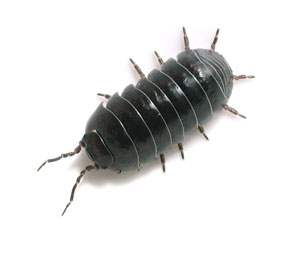 Multiguard Snail Pellets and beer traps will also help with slaters. Otherwise, home made traps from upturned citrus halves (after juicing) and piles of potato peelings (put them on an icecream container lid) make spots slaters will congregate to feed. By collecting these in the morning you can help keep numbers down. The photo below was taken by a customer - Kylie H. and shows just how successful these citrus traps can be!
Multiguard Snail Pellets and beer traps will also help with slaters. Otherwise, home made traps from upturned citrus halves (after juicing) and piles of potato peelings (put them on an icecream container lid) make spots slaters will congregate to feed. By collecting these in the morning you can help keep numbers down. The photo below was taken by a customer - Kylie H. and shows just how successful these citrus traps can be!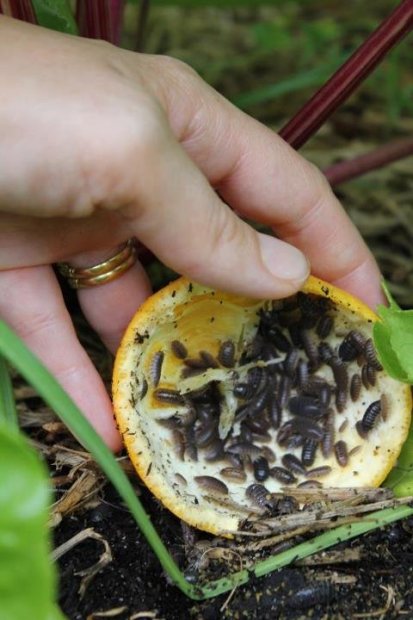 Again - check places like underneath pots, bricks or timber for spots where they congregate during the day. Take out boiling water and pour over them. Add a teaspoon of dishwashing liquid for even more effectiveness.
Again - check places like underneath pots, bricks or timber for spots where they congregate during the day. Take out boiling water and pour over them. Add a teaspoon of dishwashing liquid for even more effectiveness. 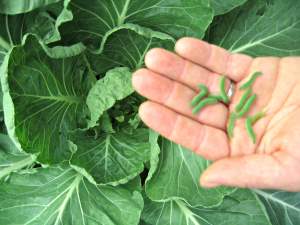 Winter is the time of the caterpillar - from the fluffy black "fuzzy wuzzies" (NOT spitfires - who only feed on eucalyptus) to the cabbage butterfly and cabbage moth. Hand picking is the most eco-friendly way to get rid of them. You do need patience and good eyesight; although the black droppings (called "frass") they leave behind usually help track them down. Usually caterpillars are under the leaves. Should you use a spray to deter or kill them, you will need to make sure you spray under the leaves for effectiveness.
Winter is the time of the caterpillar - from the fluffy black "fuzzy wuzzies" (NOT spitfires - who only feed on eucalyptus) to the cabbage butterfly and cabbage moth. Hand picking is the most eco-friendly way to get rid of them. You do need patience and good eyesight; although the black droppings (called "frass") they leave behind usually help track them down. Usually caterpillars are under the leaves. Should you use a spray to deter or kill them, you will need to make sure you spray under the leaves for effectiveness.
 For further reading on cabbage butterfly and cabbage moth,
For further reading on cabbage butterfly and cabbage moth, 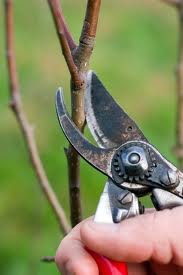 Apart from controlling the size and shape of trees, encouraging replacement fruiting wood and sunlight penetration, neatly pruning trees is important. Wide branch union angles, unclustered branches and fruit reduce the areas where pests and diseases can build up.
Apart from controlling the size and shape of trees, encouraging replacement fruiting wood and sunlight penetration, neatly pruning trees is important. Wide branch union angles, unclustered branches and fruit reduce the areas where pests and diseases can build up.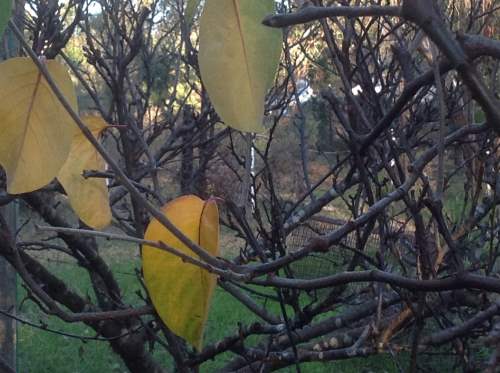 While deciduous plants may look totally inactive during the winter dormancy, there is a lot of hormonal and bio-chemical activity going on under the bark. One of these is the production of Gibberellins, the hormone responsible for flower bud initiation and therefore the amount of fruit set.
While deciduous plants may look totally inactive during the winter dormancy, there is a lot of hormonal and bio-chemical activity going on under the bark. One of these is the production of Gibberellins, the hormone responsible for flower bud initiation and therefore the amount of fruit set.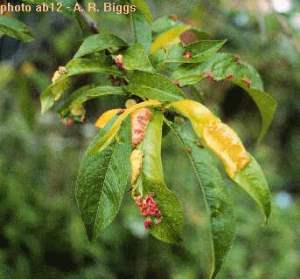 Copper sprays help control most fungal and bacterial diseases such as Leaf curl, Shot-hole, Freckle, Black spot, Brown rot, Bacterial canker and Sooty mould. They should be applied to all fruit trees, including evergreens, and to most vine crops. (This internet images shows peach leaf curl)
Copper sprays help control most fungal and bacterial diseases such as Leaf curl, Shot-hole, Freckle, Black spot, Brown rot, Bacterial canker and Sooty mould. They should be applied to all fruit trees, including evergreens, and to most vine crops. (This internet images shows peach leaf curl)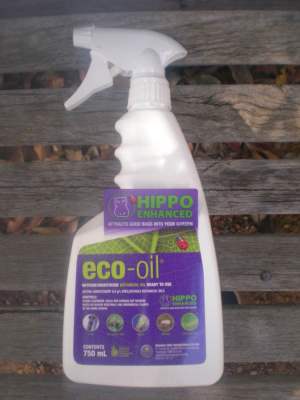 Oil sprays are mainly used to help control scale, but they can also help to reduce mite numbers on deciduous trees. It works by leaving a film of oil over leaves and branches that smothers the tiny young insects as they hatch from the eggs. With some pests such as citrus leaf miner, it can also deter the adult moth from laying eggs.
Oil sprays are mainly used to help control scale, but they can also help to reduce mite numbers on deciduous trees. It works by leaving a film of oil over leaves and branches that smothers the tiny young insects as they hatch from the eggs. With some pests such as citrus leaf miner, it can also deter the adult moth from laying eggs.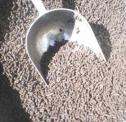 It is important to note that deciduous trees do 75% of their year’s root uptake of nutrients between budswell and Xmas/New Year, so that’s when most of your fertilising should be done, especially on heavier soils.
It is important to note that deciduous trees do 75% of their year’s root uptake of nutrients between budswell and Xmas/New Year, so that’s when most of your fertilising should be done, especially on heavier soils. 
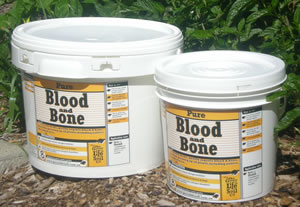 OK, not strictly speaking NEW, but we find some customers aren't aware of this fantastic quality product we produce. It is PURE blood and bone (no fillers, sawdust or sand like you find in many commercial brands of 'blood & bone based fertlisers' at the box stores).
OK, not strictly speaking NEW, but we find some customers aren't aware of this fantastic quality product we produce. It is PURE blood and bone (no fillers, sawdust or sand like you find in many commercial brands of 'blood & bone based fertlisers' at the box stores). 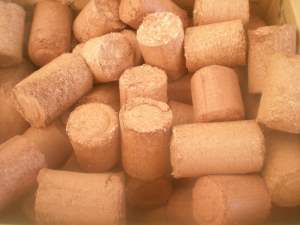 Do you have a wood fire? Do you use a wood fired pizza oven? Waste Not Wood Not Briquettes are a locally made, award winning product made from compressed pure jarrah sawdust (no glues) otherwise destined for landfill. They replace the need for kindling and are handy to have around.
Do you have a wood fire? Do you use a wood fired pizza oven? Waste Not Wood Not Briquettes are a locally made, award winning product made from compressed pure jarrah sawdust (no glues) otherwise destined for landfill. They replace the need for kindling and are handy to have around. 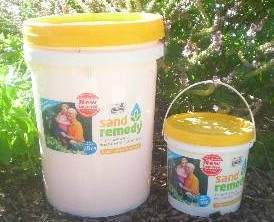 It's time to start getting your garden beds ready for Spring planting. To help ensure your garden lasts the distance into summer, we've got a special deal on our Sand Remedy. Sand Remedy is a mixture of minerals - including bentonite clay; which help with nutrient and water retention. You need to mix it into the top 10cms (approx) of your soil. Sand Remedy stays there - permanently - and bonds with the sand particles to create a loam. This loamy structure acts like a sponge, making your soil easier to re-wet. It also helps hold onto that valuable moisture and nutrients, meaning less leaching occurs. Additionally, Sand Remedy contains rock dust, which provides a range of trace elements missing in our gutless, sandy soil - plus beneficial microbes which really help establish a healthy growing environment for plant roots. We recommend incorporating organic matter (aged compost and/or manures) or our vegetable concentrate blend with Sand Remedy, and always mulch your soil in summer.
It's time to start getting your garden beds ready for Spring planting. To help ensure your garden lasts the distance into summer, we've got a special deal on our Sand Remedy. Sand Remedy is a mixture of minerals - including bentonite clay; which help with nutrient and water retention. You need to mix it into the top 10cms (approx) of your soil. Sand Remedy stays there - permanently - and bonds with the sand particles to create a loam. This loamy structure acts like a sponge, making your soil easier to re-wet. It also helps hold onto that valuable moisture and nutrients, meaning less leaching occurs. Additionally, Sand Remedy contains rock dust, which provides a range of trace elements missing in our gutless, sandy soil - plus beneficial microbes which really help establish a healthy growing environment for plant roots. We recommend incorporating organic matter (aged compost and/or manures) or our vegetable concentrate blend with Sand Remedy, and always mulch your soil in summer.




















